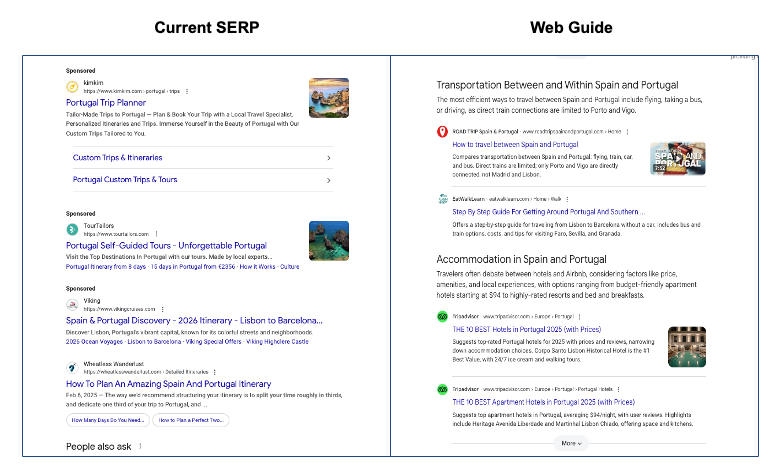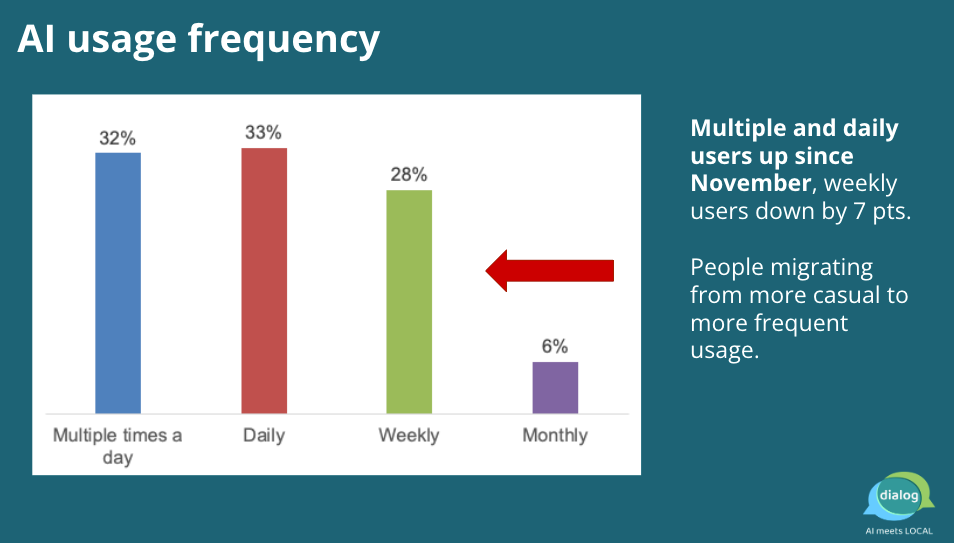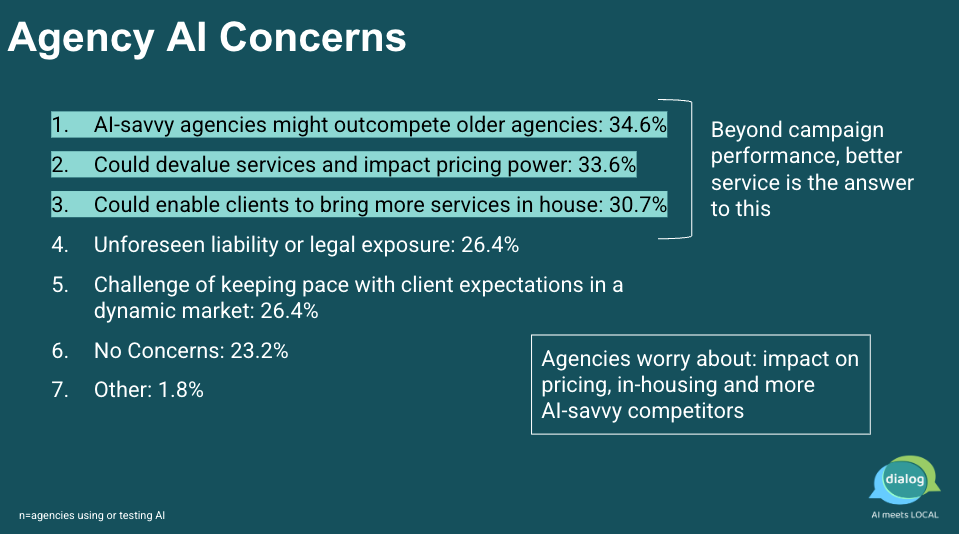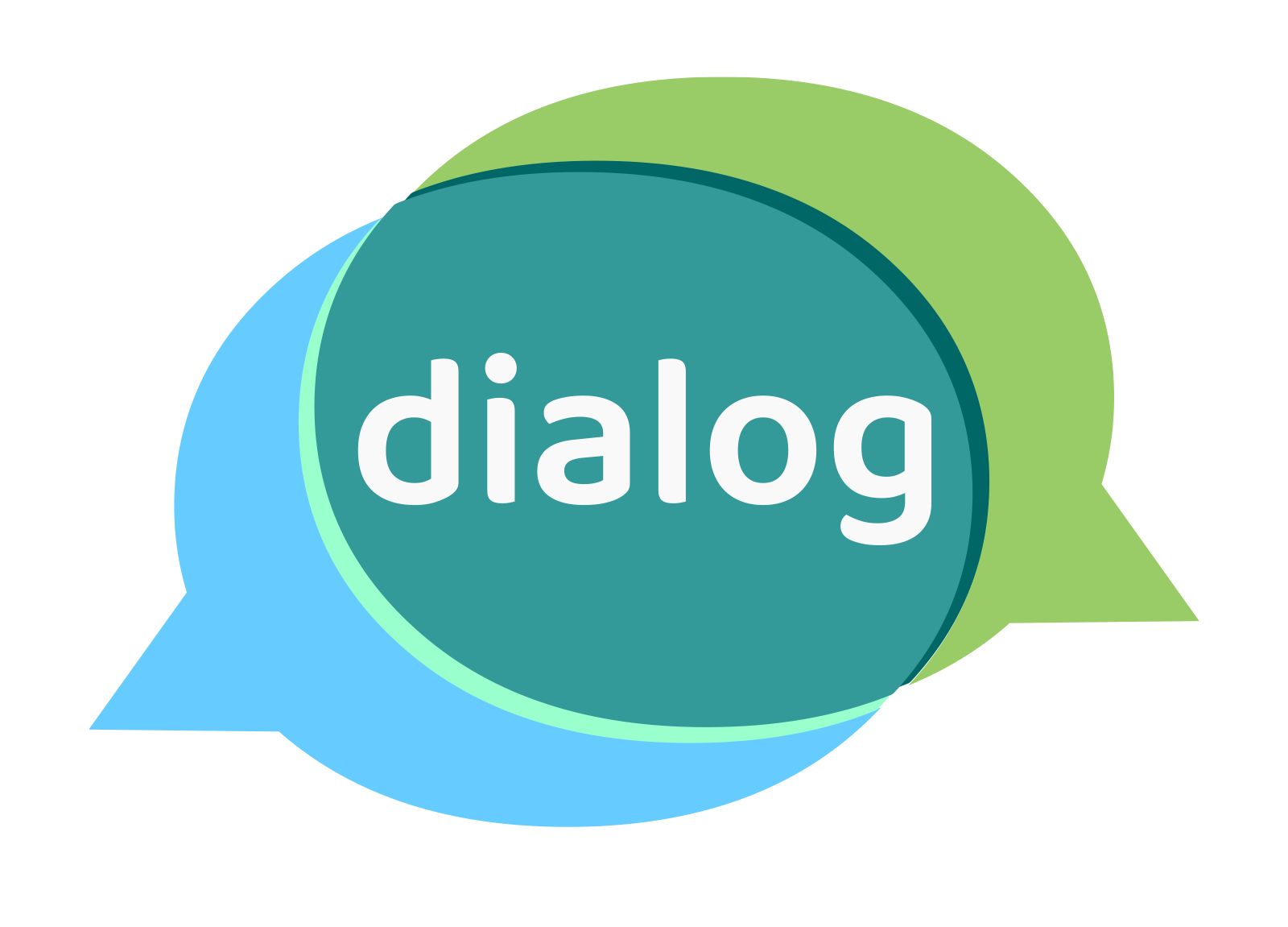Google Web Guide, AI Search Growth, Agency Threat, AI Boasting Backfires

Google Web Guide: Search-AI Blend
In its Q2 earnings release and earnings call this week, Google took pains to emphasize that it was winning. It beat expectations and posted strong growth across business units. Google said Gemini now has 450 million users, AI Overviews have 2 billion users and Google says it's seeing increased engagement among younger users. According to Google, everyone loves its AI features. (Our data support a positive perception of AIOs.) However, financial analyst Mark Mahaney questioned the wisdom of Google's "two surfaces" approach (presumably AI Overviews, AI Mode, Gemini). He asserted, "There’s a counterargument that just having that unified search and being able to discern the intent of the search ... could give you a material advantage over other offerings in the market." Google's current mix of AI experiments and integrations is "working" in some sense, but it's also an incoherent mix of experiences. Enter a new search experiment: Web Guide. Offering a blended AI-search UI, it uses AI to organize sites into groupings but the page looks more like a traditional SERP. "Web Guide groups web links in helpful ways — like pages related to specific aspects of your query ... [and] uses a custom version of Gemini to better understand both a search query and content on the web, creating more powerful search capabilities that better surface web pages you may not have previously discovered." It's early, but this does seem like a promising approach that could satisfy Google critics and potentially provide a more integrated AI-search user experience.


AI Search Growth Accelerating
OpenAI says that ChatGPT has more than 500 million users who send "more than 2.5 billion messages to the platform per day globally." While much of this activity isn't about "search," it's roughly 15% of Google's daily query volume. As we've previously discussed, there are people who think that AI search adoption claims are overblown and that marketers shouldn't focus on AI absent evidence of meaningful adoption. But that may be happening now. A roundup of traffic data in the Wall Street Journal argues that almost 6% of browser-based US search traffic now originates from AI platforms such as ChatGPT or Perplexity. That figure has doubled since 2024, while other data firms show similar growth. Relying on third party estimates, Forrester Consulting says that AI-generated traffic is now between 2% and 6% of total organic B2B traffic, growing 40% per month. That could quickly put it into double digits by the end of this year. In our data we've seen a migration from casual to more frequent AI usage. However, as ChatGPT itself acknowledges, search is just one use case among many. Indeed, the relationship between ChatGPT and Google is more complex than the zero-sum search debate recognizes. For its part, Google was eager during its earnings call to make clear that its AI growth is accelerating, that it's not seeing search erosion and that Gemini is almost at usage parity with ChatGPT.


Is AI an Existential Threat to Agencies?
Sam Altman famously (or infamously) said, "95% of what marketers use agencies, strategists, and creative professionals for today will easily, nearly instantly and at almost no cost be handled by the AI." While this was undoubtedly calculated to get attention, it's directionally true: many marketing tasks will be done by AI enabled systems, albeit with some human supervision (AI ads can outperform human-made ads). There's also a shift in progress from the major agencies to the big tech platforms (e.g., Meta, Google) as centers of gravity in the advertising world. This existential moment is not lost on the major holding companies as well as smaller, independent firms. Some ad executives argue AI is a powerful tool that makes their employees more productive and creative. Others contend that AI can't truly replace human creativity. But the field is being disrupted for sure. Agencies were among the fastest AI adopters but they also recognize risks (see slide below). Then there's the "agentic internet" and the idea that ad campaigns of the future will involve machine-to-machine interaction, which may call for radically different content and creative. Yet, brand building remains critical – and that still requires smart people.


Trump AI Plan: 'You Go Have Fun'
This week the Trump Administration announced its AI Action Plan, an anti-regulatory program and quid pro quo for the group of AI chieftains, who've recently embraced him. The plan is a mix of executive orders and near-term federal policy actions that aim to enable US companies to win "the AI race" with China, defeat AI regulation, accelerate data center construction and other AI infrastructure, enable training on copyrighted materials and prohibit "woke" outputs in LLMs. It also has a very anti-environmental bias, exempting AI-related infrastructure projects from environmental review and regulations. A further aim is to foster dependence on American AI platforms among US allies (read: Europe). There are some things to like about it but many things to be concerned about. Among them, the disregard for AI environmental impacts (e.g., water usage, pollution), the downplaying of AI safety and vulnerabilities, and the effort to censor AI output, despite content-neutrality language. Some of this plan can be implemented by the executive branch but other elements will require Congressional support and some will certainly be challenged in court, making the timing of a full rollout uncertain.


AI Boasting Backfires for Consultants
Professional services and consulting firms are also facing disruptive AI pressure. The discussion around big consulting firms like McKinsey and BCG is apocalyptic, though many push back on that idea, arguing that human consultants will always be necessary. However the business model of consulting, project based work and hourly billing, may be toast. Recently PricewaterhouseCoopers (PwC) was publicly bragging about AI efficiencies and cost savings from AI adoption. (It's also laying off junior staffers.) That reportedly prompted some clients to start asking for discounts. The firm said that some pricing concessions have been made but was coy about their degree and extent. The point is that PwC's promotion of its AI adoption and efficiencies backfired, which might have been predicted. EY was recently in a similar situation after talking about how AI saved its tax pros 14 hours per week. Here are the choices: be quiet about your AI efficiencies or proactively adopt new pricing models and restructure. Regardless, there will be downward price pressure on many of these professional services firms going forward, which will lead to more AI reliance and additional layoffs in turn.


Everything Else
- Data: state of Foundational Models and their impact on industries.
- Pew: Google AI Overviews boost zero-click, kill CTR.
- Top AI sources: Wikipedia, news, gov sites. Also Reddit, YouTube.
- 72% of US teens confide in, using AI for companionship.
- ChatGPT using Google SERP Snippets in answers, Maps links in results.
- FDA AI, supposed to speed drug approvals, is making up studies.
- LLMs transmit their traits to other models, even through "meaningless data."
- Nearly 30% of Grok citations are to X.
- AI may have ultimately a radical impact on user interfaces.





